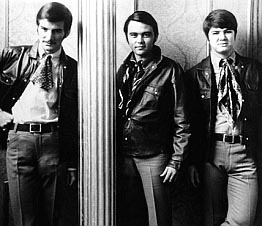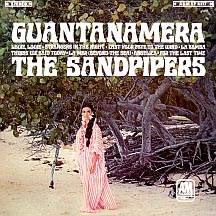THE SANDPIPERS
Guantanamera
Robert Mitchell, a classically-trained pianist and silent screen era organist from Los Angeles, formed The Mitchell Boys Choir, a highly-trained, ever-changing group of young singers. Starting around 1936, they appeared in and recorded songs for many Hollywood movies (Angels With Dirty Faces, Going My Way, The Bishop's Wife and dozens of others). Richard Shoff, Jim Brady and Mike Piano, three youngsters from L.A. born within months of each other in 1944, became members of the choir during the 1950s, performing for Pope Pius XII and Pope John XXIII and in the process forging a friendship that lasted well into adulthood. They later gained fame as vocal trio The Sandpipers, going through a couple of name changes prior to achieving success; first choice was The Four Seasons (another friend, Nick Cahuernga, sang with them at the time), but in 1962 they were forced to reconsider when a certain New Jersey quartet took the music world by storm. The recent high school graduates became The Grads (why not?), and caught the interest of Barry DeVorzon, the owner of Valiant Records.
A single, "Once Again" (penned by DeVorzon with Bodie Chandler), was released by the Grads on Valiant in the latter weeks of 1962, after which the still-teenage group became regulars at Harrah's Club in Lake Tahoe, leading to other engagements on the casino circuit. From the beginning, the Grads were an "easy listening" vocal act following a path set by comparable trio The Lettermen. A couple of Grads singles appeared in 1964, the first with producer Nick Venet on MGM (the Bobby Troup tune "It Happened Once Before") and an unsuccessful attempt by Venet and Gary Usher to fit them into a hot rod bag with "The Wild One," released on Mercury.
The best (and most lucrative) fit for the trio seemed to be in the high-end nightclubs that were always open to their brand of ballad singing. While performing at the Sands in Las Vegas, they met Herb Alpert, who signed the group to his expanding A&M Records operation. After one mid-'66 single as the Grads ("Everything in the Garden"), they changed their name to The Sandpipers, disregarding the long run by a preexisting Sandpipers group (featuring Ralph Nyland and Anne Lloyd, among others) that, with Mitch Miller's orchestra, had been recording children's records since the late '40s. There was also a Pensacola, Florida-based girl group called the Sandpipers, whose only official single, "It's All Over But the Crying," was issued on the small Tru-Glo-Town label at about the same time A&M's Sandpipers broke big with their signature hit, effectively securing the name for themselves.
"Guantanamera" ("Girl From Guantanamo") was originally a poem written in the 1890s by Cuban author Jose Marti. Classical guitarist and composer Hector Angulo adapted it to song, followed by folk legend Pete Seeger's popular 1963 version, on which the Sandpipers based their recording. Impeccable Spanish accents and Mike's sincerely-delivered spoken passage in English ('...before dying, I want to share these poems of my soul...') proved irresistible; it went top ten in September 1966, the most popular and, ultimately, familiar of the many versions recorded over several decades. NARAS took notice, nominating them in the Grammy category Best Contemporary (Rock and Roll) Group Performance.

For an encore, they drew from a most unlikely source: Richard Berry's 1957 classic "Louie, Louie." Using The Kingsmen's paradoxical one-take '63 megahit as the template, the ultra-easy result came off as a surreal exercise in how to alter a song past the point of reason...so of course it hit the top 40 and became the second-biggest-selling version of the song! Album sales were strong the next few years as the group enjoyed a steady presence on adult-targeted pop stations with several easy listening chart hits. Future stars John Denver ("For Baby," early '67) and Gordon Lightfoot ("Softly," summer '68) provided material, while several more foreign language recordings built on their "Guantanamera" fame, including "Bon Soir Dame" (with French and English lyrics by Bud Dashiell of folk duo Bud and Travis) and Spanish tunes "Cuando Sali De Cuba" ("When I Left Cuba") and "Quando M'Innamoro" (a Spanish version of the Engelbert Humperdinck hit "A Man Without Love"). No surprise that the Sandpipers developed a large international fan base.
Some of the early recordings for A&M featured female backing vocalists, but after a short time a permanent singer was hired. Pamela Ramcier was essentially a fourth member of the group; in addition to her uncredited contributions to the studio recordings (session musicians were sometimes listed on back covers of albums, but her name never seemed to be included), she also toured with them on a regular basis. In the fall of 1969, "Come Saturday Morning," a Fred Karlin-Dory Previn song from The Sterile Cuckoo starring Liza Minnelli in her first Oscar-nominated role, was recorded by the Sandpipers and featured prominently in the film. The single stuggled when initially released, but caught fire a few months later when it was nominated for an Oscar for Best Original Song; the Sandpipers performed it on the April 1970 broadcast, reaching tens of millions of viewers in the U.S. alone. Airplay and sales kicked in and the single made the top 20 several weeks later.
They recorded the theme for Russ Meyer's X-rated film "Beyond the Valley of the Dolls" (its screenplay was written by a twenty-something Roger Ebert), which ended up on the flip side of the next single. "Santo Domingo" utilized Mike Piano's soothing knack for recitation (as had "Guantanamera") and told an exotic, bittersweet tale; it had a mild chart run in 1970 and was followed by their final chart single, "Free to Carry On," at the end of the year. A&M dropped The Sandpipers in 1972, but they continued to perform live for the next few years before breaking up...never to reunite, strangely enough, though Richard, Jim and Mike remained close friends.


